A peek through the knothole at two record albums featuring classic Walter Lantz characters – Woody Woodpecker, Chilly Willy, Andy Panda – as well as the radiant Mrs. Lantz.
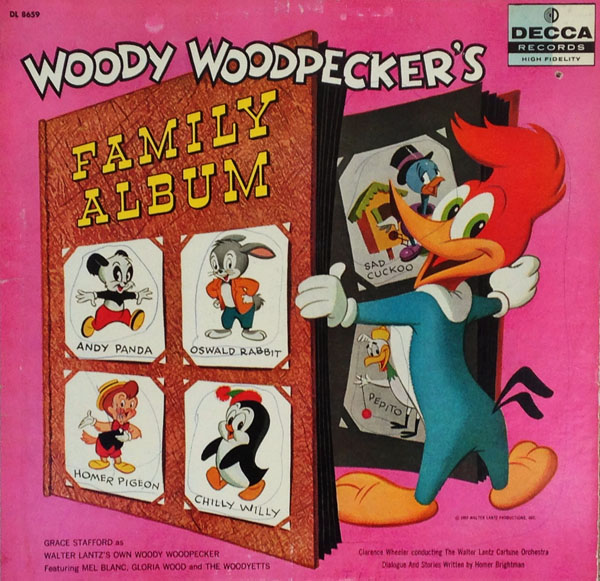
WOODY WOODPECKER’S FAMILY ALBUM
Decca Records DL-8659 (12” 33 1/3 RPM LP / Mono / 1957)
Reissue: MCA Records MCAD-13300 (12” 33 1/3 RPM Picture Disc LP / Mono / ca. 1978)
Producer: Charles Dant. Writer: Homer Brightman. Musical Director: Clarence Wheeler. Running Time: 37 minutes.
Voices: Grace Stafford (Lantz) (Woody Woodpecker, Chilly Willy); Mel Blanc (Pepito, Sailor, Malamute, Andy Panda, Fluten Bluten, Heinie the Hyena, Homer Pigeon, Cuckoo, Oswald the Rabbit) Gloria Wood (Chilly Willy, Oswald the Rabbit, Homer Pigeon, Lead Vocalist); The Woodyettes, The Walter Lantz Cartune Orchestra.
Songs: “The Woody Woodpecker Song” by George Tibbles and Ramey Idriss; “Pepito Chickito” by Clarence Wheeler and Irving Bibo; “Chilly Willy, The Penguin” by Irving Bibo, Jay Carroll and Clarence Wheeler; “Heinie, the Laughing Hyena” by Irving Bibo and Gus Call; “The Woody Woodpecker Waltz” by Irving Bibo and Clarence Wheeler; “My Little Brown Uke,” “The Birthday Song” by Clarence Wheeler, Gus Call and Homer Brightman; “The Cuckoo Clock Song,” “Homer Pigeon” by Clarence Wheeler and Gus Call; “Andy Panda Polka,” “Oswald the Rabbit Hop,” “The Woody Woodpecker March” by Irving Bibo and Eugene Poddany.
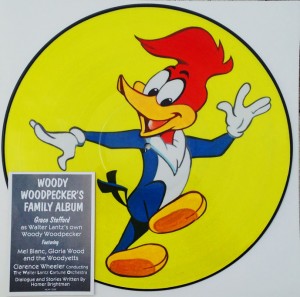 This is an “ultimate” Walter Lantz record album of sorts, because it combines his most famous characters with the voices of his wife Gracie, Mel Blanc and Gloria Wood, all of which hold claim to significant Lantz cartoon history.
This is an “ultimate” Walter Lantz record album of sorts, because it combines his most famous characters with the voices of his wife Gracie, Mel Blanc and Gloria Wood, all of which hold claim to significant Lantz cartoon history.
To some, the first question that may spring to mind is, “What’s Mel Blanc doing here?” Didn’t he get shafted when his vocal creation, the “Ha-ha-ha HAA-ha!” Woody signature, was used in dozens of cartoons long after he left the studio? Didn’t “The Woody Woodpecker Song” (the first Oscar-nominated song from an animated short) become a monster novelty hit that became so because of that very hook?
According to The Walter Lantz Story by Joe Adamson, when Blanc first pursued legal action, he was laughed at, so he recorded his own version of the song. Its success—as well as the hit status of the song by other artists—rekindled his desire for compensation. His suit was taken to the L.A. Superior Court, but lost because, in Blanc’s words, “Who can copyright a laugh?”
Blanc’s appeal was cut short when Walter Lantz did something that would be considered shocking, especially today. He offered settlement to Blanc, who said, “Walter’s a very wonderful guy.” This record yields a bumper crop of Blanc voices. Blanc, Wood and Stafford occasionally overlap vocal assignments between tracks, with Blanc playing Homer Pigeon on “The Birthday Song” and Gloria Wood playing him on “Homer Pigeon,” for example.
 Gloria Wood recorded the biggest hit version of “The Woody Woodpecker Song” with Harry Babbitt and Kay Kyser’s big band, and then she and Babbitt sang it over the titles of the cartoon, Wet Blanket Policy (1948). The song became so overplayed, it started to drive even Lantz a little crazy. Clearly, many of the other songs on the Decca album were created in hopes that they might repeat the success of Woody’s song (particularly “Chilly Willy the Penguin,” which featured big band singer Wee Bonnie Baker over some of Chilly’s cartoons). But none of them hit as big.
Gloria Wood recorded the biggest hit version of “The Woody Woodpecker Song” with Harry Babbitt and Kay Kyser’s big band, and then she and Babbitt sang it over the titles of the cartoon, Wet Blanket Policy (1948). The song became so overplayed, it started to drive even Lantz a little crazy. Clearly, many of the other songs on the Decca album were created in hopes that they might repeat the success of Woody’s song (particularly “Chilly Willy the Penguin,” which featured big band singer Wee Bonnie Baker over some of Chilly’s cartoons). But none of them hit as big.
The album contains many of these songs, along with several that appeared in Lantz cartoons. Each selection is somewhat lengthy. In the style of mid-20th century recordings that were released on LP, 45 and 78 RPM singles—the length is due to the wish to fill up about three minutes on each side of a single, enabling Decca to release some songs separately. For that reason, the pace is often a little too leisurely and repetitive, with “The Woodyettes” singing similar choruses over and over, and the soloists offering verse after verse in almost every song.
It’s still solid gold for a cartoon lover, though, because it captures the ‘50s sound of Lantz cartoons, with studio musical director Clarence Wheeler handling the arrangements—plus Lantz (and former Disney) story artist Homer Brightman contributing the script and some lyrics.
MCA reissued this album in the late ‘70s on a picture disc (alongside Hanna-Barbera’s Charlotte’s Web). The sound quality was very good for a picture disc, but there were no album notes or track lists, just a little title card.
GIVE A LITTLE LISTEN
“The Birthday Song” and “Oswald the Rabbit Hop”
In the first song, Mel Blanc voices Oswald. In the second selection, Gloria Wood speaks and sings for the Lucky Rabbit and Mel Blanc—this time as Uncle Jack Rabbit—sings a song about a coyote that is not listed on the album. Note that both tracks are lengthy and have division points so they could also be released on multiple sides of shorter records.

WOODY WOODPECKER SONG ALBUM
Golden Records LP-112 (Mono / 12” LP / 00 minutes / 1962)
CD Reissue: Drive Entertainment GD2-47112 (1998)
Downloads: Verse Music (2014) Available on iTunes and amazon
Executive Producer: Arthur Shimkin. Musical Direction: Mitch Miller, Jimmy Carroll, Jim Timmens. Running Time: 29 minutes.
Performers: Grace Stafford Lantz (Woody Woodpecker); Dal McKennon (Inspector Willoughby); The Sandpipers, The Golden Chorus.
Songs: “The Woody Woodpecker Song” by George Tibbles and Ramey Idriss; “Saddle Sore Woody,” by Walter Greene and Paul Smith; “Cartoon Showtime,” “Space Mouse Cadet” by Walter Greene and Judy Zahler; “Popcorn Song” by Clarence Wheeler; “Hawaiyuh,” “Trudging Along” by Walter Greene and Cal Howard; “Inspector Willoughby March,” “It’s The Bearies,” “The Hill Bearies” by Darrell Calker and Judy Zahler; “The Woody Woodpecker Waltz” by Irving Bibo and Clarence Wheeler; “My Little Brown Uke” by Clarence Wheeler, Gus Call and Homer Brightman; “Andy Panda Polka,” “The Woody Woodpecker March” by Irving Bibo and Eugene Poddany; “Chilly Willy, The Penguin” by Irving Bibo, Jay Carroll and Clarence Wheeler.
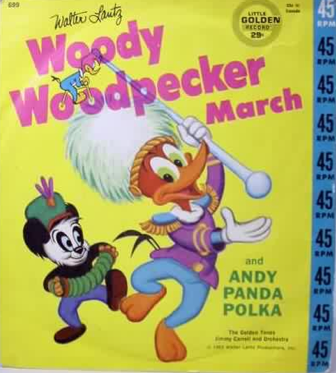 Gracie Lantz appears on six songs in this LP. One of them is a ‘50s Sandpipers version of “The Woody Woodpecker Song” with her Woody voice spliced in abruptly in place of the Sandpiper member on the original recording. The other five songs are solos, recorded in the mellow vibraphonic style of Jim Timmens in the early ‘60s.
Gracie Lantz appears on six songs in this LP. One of them is a ‘50s Sandpipers version of “The Woody Woodpecker Song” with her Woody voice spliced in abruptly in place of the Sandpiper member on the original recording. The other five songs are solos, recorded in the mellow vibraphonic style of Jim Timmens in the early ‘60s.
Timmens’ Golden arrangement of “Wackity Woody,” an alternate main title for Woody cartoons, was also used for end credits of Lantz TV cartoon packages, as well as on DVD releases. The “Andy Panda Polka” and “The Woody Woodpecker March” were co-written by Eugene Poddany, whose credits include Chuck Jones’ Tom and Jerry cartoons, Jones’ How the Grinch Stole Christmas and RCA’s Cat in the Hat Songbook album.
Several of the songs that also appear on the Decca LP are given a different treatment by the Golden artists. Delightful and authentic as the Decca versions are, the Golden renditions are enjoyable, too. Golden needed songs to be brief in case they were released as 6” 78 RPM singles, so the Golden songs benefit from faster tempos and more energy.
This album also came along after Lantz introduced new characters, so it includes songs about Inspector Willoughby, The Bearies and Space Mouse. Golden got a lot of mileage out of these songs, as they issued them on a number of other records for about two decades.
GIVE A LITTLE LISTEN
“Cartoon Showtime”
When NBC broadcast The Woody Woodpecker Show on Saturday mornings in the late ‘70s/early ‘80s, the instrumental track of this song was used, presumably as filler for the beginning of the show.


 GREG EHRBAR is a freelance writer/producer for television, advertising, books, theme parks and stage. Greg has worked on content for such studios as Disney, Warner and Universal, with some of Hollywood’s biggest stars. His numerous books include Mouse Tracks: The Story of Walt Disney Records (with Tim Hollis). Visit
GREG EHRBAR is a freelance writer/producer for television, advertising, books, theme parks and stage. Greg has worked on content for such studios as Disney, Warner and Universal, with some of Hollywood’s biggest stars. His numerous books include Mouse Tracks: The Story of Walt Disney Records (with Tim Hollis). Visit 









































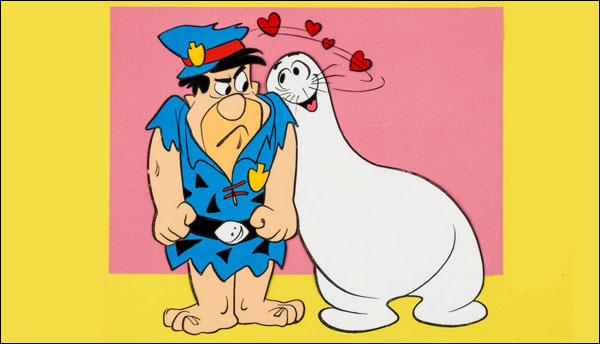
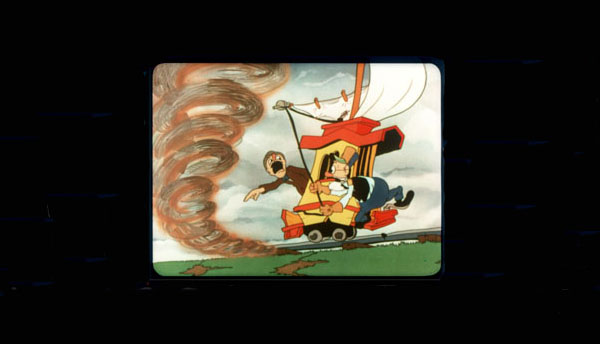










Amazingly, real woodpeckers actually do emit a cry that sounds remarkably like the Woody Woodpecker laugh.
Mel Blanc’s Woody voice was used to good effect several times on records, most notably on the album “Woody Woodpecker’s Talent Show”. Though I grew up with hearing the voice of Grace Stafford as Woody, Mel’s interpretation has an authentic ring to it as well.
I also grew up listening to the Sandpiper’s version of the “Woody Woodpecker Song” and I actually like this re-dubbed version better. The Woody sound on the original track doesn’t sound anything like Woody’s laugh. So even though it’s evident where Grace’s Woody voice was inserted into the re-recording, it’s much more satisfying to hear a laugh that sounds right.
The Space Mouse song makes one major error–Space Mouse is not an American mouse, but comes from the planet Rodentia. It’s a good song, but whoever wrote it did not know much about the character. Most of the other songs are pretty satisfying interpretations of the characters.
Both these albums are rich examples of the charm and appeal of the Lantz characters. While perhaps not as loveable or memorable as Disney’s creations, they have their own unique quality. Lantz promoted the characters pretty heavily, especially during the late 50’s and early 60’s.
The original Woody Woodpecker Show was the best version, because it featured live-action interaction with Walter Lantz. When it aired on Saturday mornings in the 70’s, I was disappointed to see that the live action portions had been cut out. Only a handful of the original episodes have been released on DVD. I for one would support a DVD release of the entire original Woody show.
Thanks for another great post!
Thanks for another great comment!
Maybe the reason NBC added “Cartoon Showtime” to the beginning of the’70s edition of the show was to fill in the space left by the removed Lantz segments.
I’m having trouble imagining an Inspector Willoughby song.
Mel Blanc’s version of the WOODY WOODPECKER song was sparse. There was no orchestra backing on it because it was recorded on June 5th, 1948 (the day after my 3rd birthday, BTW), in the middle of a nearly year-long strike against the record companies by the musicians’ union! So Mel made the record backed only by Jack Benny’s quartet, The Sportsmen. Capitol, realizing that they had a potential hit with this recording, rushed it into production and it was released on June 28th! Despite there being no union musicians on the record, it STILL sold a million copies! Oddly, although the modern version of the lp record came out that year and the 45 rpm record came out less than a year later, Capitol’s WOODY WOODPECKER song was never released in microgroove formats!
Mel was not in violation of his exclusive contract to do cartoon voices only for Warner Brothers when he made a string of Capitol records as Woody. That WB contract was only for cartoon film work and did not apply to records, radio, or any other media. Between 1949 and 1955, Mel encored the WOODY WOODPECKER song with ten stories and one more song. He also made two non-commercial promo records as Woody. The commercial releases were:
WOODY WOODPECKER AND HIS SPACE SHIP, WOODY WOODPECKER AND HIS TALENT SHOW, WOODY WOODPECKER AND THE ANIMAL CRACKERS, WOODY WOODPECKER AND THE LOST MONKEY, WOODY WOODPECKER AND THE SCARECROW, WOODY WOODPECKER AND THE TRUTH TONIC, WOODY WOODPECKER IN MIXED-UP LAND, WOODY WOODPECKER MEETS DAVY CROCKETT(!), WOODY WOODPECKER POLKA, WOODY WOODPECKER’S FAIRY GODMOTHER and WOODY WOODPECKER’S PICNIC. (Whew!)
The two promo records: In 1950, on one of several promo records Mel made for Capitol’s children’s records during his ten years with them, Mel spoke as Woody and also as Bugs Bunny and a record dealer visiting the Capitol offices! The record was a 45 rpm disc and it was called SNEAK PREVIEW. Also heard on that record was Pinto Colvig as Bozo the Clown. In 1953, Woody debuted on radio with THE WOODY WOODPECKER SHOW, years before the TV program of the same name. Woody was the star, of course, but Mel, as himself, served as host of the show. In that connection, he made a 78 rpm two-part promo, also titled THE WOODY WOODPECKER SHOW, to be distributed to Mutual Broadcasting System radio stations to convince them to include the program in their schedule. On that record, Mel visited with Woody, discussing what the kid show was about. But Mel also spoke directly to station owners/managers, with business details about the program. Because it was not a promo specifically for Capitol Records sales, the Capitol logo does not appear on the demo, but the evidence on the disc establishes that it was indeed recorded and pressed by Capitol Records.
All of the above information comes from Jack Mirtle’s book, THE CAPITOL RECORDS CHILDREN’S SERIES, 1944 TO 1956–THE COMPLETE DISCOGRAPHY. The book was self-published in Canada by the author, who lives in British Columbia. I contributed much info to the book, and at present, I am the sole distributor of the book for sales throughout the USA, with copies right here at my house. Please contact me if you are interested in obtaining a copy. I’ll also be glad to answer any questions about the book.
That is fantastic information, Walt! Thank you for taking the time — and caring enough — to provide it all. I bought a copy of the Capitol book some time ago and have read parts, but not that part (now I am going to go back and read it cover to cover).
How can those who read these posts (whom I also thank) contact you for the book?
The Mel Blanc records were my favorites. My grandmother used to go to this record store & pick me up a new one every time she saw me. I still have them, some on 78s & some on 45. I think the only one I’m missing is WW In Mixed Up Land. Most are not in good shape, although I did get those ZIV reissues in the 70s of some of them. Do you know if Capitol still has the master tapes? I was once meeting with BMG to try to get them to do a CD package of their early 50s kiddie records. Has anyone tried this with Capitol. 1 more thing, I had the Little Golden Record of The Woody Woodpecker Song, I guess from the 50s. The WW laugh, was really lame, done I guess by one of the singers. Years later I bought the record for my kids. It was the same recording, but they edited out the laugh & inserted Grace Lantz (it sounded like). It was done so badly, because all the music suddenly stops when the laugh comes in. A bad edit. Has anyone else heard this?
Greg:
Thanks for another great post! Nice to hear some things I’ve never heard before! And Walt’s post was also a fascinating read! It’s a wonder that Capitol didn’t take Mel to court for doing that voicework for Decca.Makes me wonder if there wasn’t a secret deal brokered for him to do the Decca sessions since he got screwed out of the Woody laugh debacle!
Andy, Decca Records (now known as MCA) was the recording arm of Universal pictures/studio but since Mel was already under contract to Capitol that led to their production on that label instead of Decca. Perhaps,by this point, Mel wasn’t under contract to Capitol anymore, so Woody could come out on the in-house label.
Technically these days, it’s all under the umbrella title of Universal Music Group (“MCA” alone has been nearly dropped as a label name these days).
http://en.wikipedia.org/wiki/Universal_Music_Group
Actually it was Decca Records had a controlling steak Universal Pictures. By the time they merged with talent agency/TV titan MCA in 1962, Decca owned 89% steak in Universal
According to Michael Ruppli’s discography “The Decca Labels”, the selections on “Woody Woodpecker’s Family Album” were cut at three sessions (September 16, 23 and 25, 1957) at Decca’s studio in Los Angeles. This discography indicates that the orchestra was conducted by Clarence Wheeler, who was doing the scores for the theatrical cartoons at the time.
A thirteenth selection “Jiminy Christmas” was also recorded, and only appeared on Decca 30482 (78) and 9-30482 (45), coupled with “The Woody Woodpecker Song”.
Hi I was wondering if someone could answer my question: Why do i have what seems to be a 1 and only copy of the woodpecker polka (the pinetoppers on Coral Records) It would be fine if i had it on 45tour, but i have it on a 10″ shellac, Everyone posts the first releases as being on the decca coral 45tour. The name under the title is George Pietro.????
I had an album in the 50s, Woody Woodpecker Goes To Mars. Had a song on it, where Woody says, “2 suns in the sky, 2 trees growing side by side, and here comes a man wearing 2 hats, he hasn’t got 2 hats..he’s got 2 heads …martian sings…Two two heads heads are are better better than than one ome any any day day…” Anyone remember this?
Love to get a copy of it
As a kid I remember a 78 record that was a story about a rocket and getting hit on the head and thinking he was with two headed aliens and there was a song. Two two heads heads are are better better than than one one any any day day that’s that’s an an old old saying saying you you hear hear many many say say
Trevor and Todd – here you go: https://www.youtube.com/watch?v=Rq4Mu41mkrI&ab_channel=GregEhrbar
I’ll always remember that sad violin riff from “Fodder and Son”. It’s always playing in my head every semester ending at university, when the lousy students came to beg for every little grade fraction.
I’d carry a towel at that times.